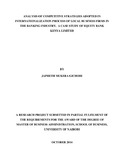| dc.description.abstract | International business describes all commercial transactions taking place between two or more
nations and across national borders. The rise of globalization presents a number of important
challenges to a business seeking international presence. Numerous strategic aspects must be
taken into account prior to commitment at an international level, and afterwards. Constant
flexibility is required to adapt to changing patterns at local, regional and international levels.
Strategies define how an organization will use its resources to gain competitive advantage in the
larger environment. Strategic formulation and management process analyses business
opportunities and threats, internal strengths and weaknesses or resource gaps, current values and
management philosophy. Organizations success in its operation is dependent on how it
formulates and pursues strategies that take advantage of external opportunities, minimize the
impact of external threats, capitalize on internal strengths and mitigate internal weaknesses. A
local company intending to expand operations into international markets must build on the right
competence to be relevant in the international market and must understand the priorities of their
target markets with challenges involved into the international market environments and in
response, develop strategies that would make it a recognizable player in the international arena.
This project study sought to identify the competitive strategies adopted and supporting factors in
internationalization of local business firms in the banking industry, using Equity Bank Kenya
Ltd. as a case study. Interviews were used for primary data and supplemented by secondary data
from bank library and websites. In conclusion, the analyzed data identified Duplication of
Business Models Strategy, Market Dominance Position strategy, Mode of Entry Strategy and
Opportunism on Government Policies Strategy as the major competitive strategies that the firms
employ to ensure successful internationalization process. The research further identified that the
underlying factors that influence above strategies to be applied during internationalization
process are; banks unique business model with unique market niche, financial back up or support
from parent company, organizational structure, corporate strategies and financial strengths and
available partnership with world recognized financing bodies. The study recommended further
research into the areas that presented limitations during the present study. Further study is
recommended on other internationalizing banks because the competitive strategies are unique
from one organization to the other. This will remove any possible bias arising when concluding
on entire banking industry | en_US |

